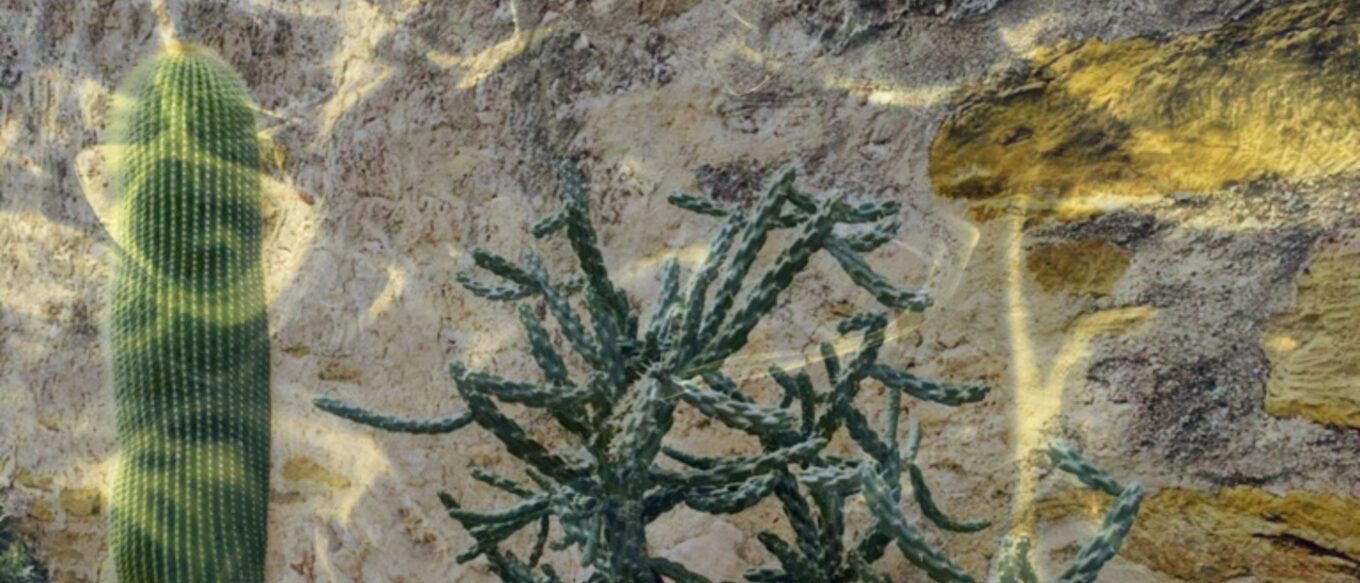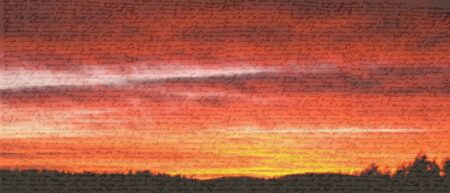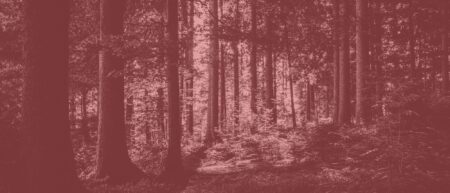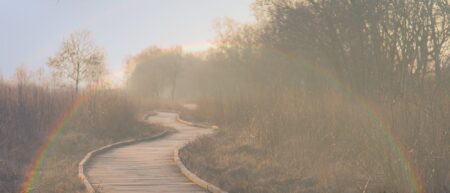A review of Zöe Bossiere’s Cactus Country: A Boyhood Memoir
I buy a hat around Halloween that says “Gloomy Graveyard Girl” on it. My Chicago neighborhood is within walking distance to five cemeteries, and hanging out in them is one of my major hobbies. These northern neighborhoods, the ones often cited as the queer ones, grew up around the graveyards. I don’t consider that the gender on the hat doesn’t match up with my perceived gender. I never intended for the hat to be a major factor in defining my gender identity. But it is.
A regular customer at the coffee shop where I’m a barista and I are chatting about the hat; how much they love it and want to know where I got it. They are nonbinary. They refer to us as nonbinary. Us. I had never identified as such, thinking that my beard and “football shoulders,” as my grandfather called them, disqualify me. Yet, it feels completely correct.
Near the beginning of their new book, Cactus Country: A Boyhood Memoir, Zöe Bossiere writes, “We craft our origin stories, as much about who we are as who we want to be. I have always been this way, we say, which is another way of saying, this is who I am.” Cactus Country traces Bossiere’s gender journey, with most of the book taking place in the titular residential campsite with their parents in the Arizona desert from the late 1990s to when she leaves the area to attend graduate school. Assigned female at birth, able to pass as a boy for a good portion of their younger life, Bossiere, who uses she/they pronouns, admits to a friend, “I don’t feel like I’m either gender, though…I just like I’m–like me, you know?”
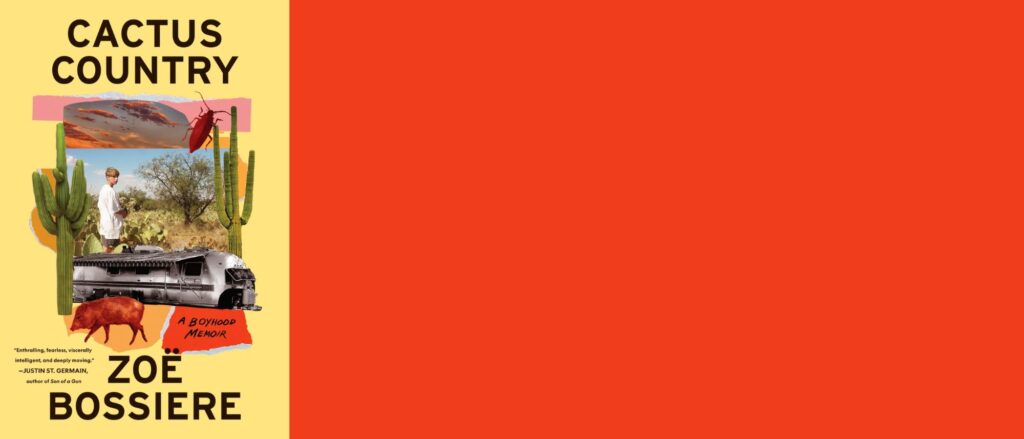
I’m an ‘80s kid who grew up in a conservative suburb of Cleveland, Ohio, where we only knew binaries. Boy or girl. Gay or straight. I didn’t know something neither boy nor girl, something in-between, that being non-binary was an option. At that age, ghosts were the only in-between I had encountered. And they scared me.
Ghosts scare Bossiere too, when they recount, “Alone in the dark, I swore I felt a sinister presence in the desert. Following me. Watching me. Biding its time. Though I told myself I was imagining it, the feeling proved impossible to shake.” Presence is another word for ghost.
Once, as my family and I passed a graveyard during a car ride back from visiting my grandparents, I prayed to the moon to not be a boy anymore. My father and grandfather had gotten into a fight. I don’t remember what specifically prompted their fight on that night. There had been too many shouting matches and objects thrown to keep an accurate inventory. I must be around eight years old, and I knew that having angry outbursts is a stereotypically masculine behavior.
Looking back, what I find interesting is that I didn’t ask the moon to make me a girl either. I had a better sense of who I didn’t want to be than who I wanted to be. A distinction that would haunt me well into adulthood.
Like Bossiere, I “…had never heard the word transgender, didn’t know to look it up…”. Even when I did, I misunderstood the parameters of being transgender. I thought you had to want a different body that only surgery could provide you. Part of me wants to solely blame growing up pre-internet. The blue bound Encyclopedias in my childhood home were the only source of information outside of what family members or teachers or the news wanted to tell us. Sometimes, we feel something before we know it, though.
In high school, a fellow student gave a presentation on a news story about the then still unfolding AIDS crisis where he used this as an example of why one shouldn’t be gay. When I challenged him on the homophobia of his statement, he repeatedly asked why I cared if he was being homophobic or not. He wanted me to admit that I was gay in front of the entire class. I kept my queerness a secret, a ghost into my early thirties. From time to time I feel someone is standing behind me even though I’m alone in my apartment. I can’t see the apparition, but I sense it.
Bossiere sets up the idea of ghostliness long before apparitions are mentioned. Early in the book, a boy Bossiere’s age pulls a pocket knife on her after she’s been playing with his seemingly-abandoned toys. The next day Bossiere plans to confront pocket-knife boy. “This time, I would be ready to pass his test,” they write “But by that afternoon the boy’s trailer was long gone, the only evidence he’d ever been in the park a few broken toys scattered in the dirt under a picnic table.” Those toys speak to that boy’s absence as well as his now-spectral presence.
The test to prove Bossiere’s boyness is like all the equipment ghost hunters use to prove the existence of a phantom in the space they’re investigating. The ghosts must prove they exist, as does Bossiere’s non-girlness. I never looked like or tried to pass as a girl. My voice, however, especially on the phone, made people think I was a girl. When I was younger, this mix up used to bother me. Like Bossiere, I wanted to be a boy even though, or maybe because, I didn’t fully match up with the gender that had been indicated on my birth certificate. Our boyness could appear or vanish like an apparition depending on who might be able to see us.
Near the end of the book, Bossiere, now an adult, moves into a haunted house. They leave behind most of their friends, don’t pick up calls from them, and some wonder if Bossiere is dead. The narrator and character identify with the undead, or the unalive, or something in-between. When Bossiere experiences the house’s haunting, they feel called back to the presence they felt as a child in the desert: “There was nowhere for anyone, even the ghostly woman, to hide. The sensation was unsettling, reminiscent of the presence watching me from the desert in Cactus Country…But I’d been a boy then, and was an adult now.”
In many ways, Cactus Country reminds me of Andrew Haigh’s queer ghost story, All of Us Strangers; in the film, you don’t know everyone is a ghost until you do. While the characters in the movie are literal ghosts, the ones in Cactus Country are mostly metaphorical ones like when they talk about “…transcending space and time until all four of us disappeared in a spectacular burst of light, like the explosion of a dying star” or when she thinks about how her and her ex-girlfriend will be going to different high schools for their freshman years, “I wanted for the second time in my life, a chance to reinvent myself, to start again.” The in-betweenness of school years allows for new possibilities of transformation, like when phantoms are created. Bossiere will begin presenting more like a girl at her new high school. I fantasized every summer that I would somehow blossom into something new, something that didn’t feel awkward, unsettled. Something that the other kids would finally accept, want to befriend. Little did I know that I would never age out of that feeling.
Still, as in any ghost story, the question for the reader remains: who is doing the haunting? What Bossiere senses in the desert could be her future self – the adult Zöe narrating the story because what is a narrator of a memoir if not the author haunting scenes from their life? The looking back where we can see the ghosts. The looking back lets us notice how we were ghosts. Like the times we could see our true selves, but others didn’t or when others said we weren’t real.
The ghost in Bossiere’s house or the presence in the desert could be the narrator or the reader or an actual ghost. I’m purposefully not settling on an answer or theory because the possibilities are of more interest to me. These possibilities rather than concrete answers are what I needed. Bossiere writes, “Uncertainty was its own kind of adventure, an echo I’d felt rippling in my blood from the day I asked for the haircut that allowed me to pass as a boy, to now, just weeks away from a decision to leave the desert that shaped me.” We all have our own desert, a ghostly realm. Adam in All of Us Strangers has two: his childhood home where the ghost of his parents live and the high rise apartment building that we will discover he haunts with Harry, two queer ghosts in love. Possibility and uncertainty are so closely related.
This essay is one of my own deserts because it’s the first time I’m connecting the boy who wished the moon would make him not a boy to the adult who heard someone else call them nonbinary and their immediate reaction that it felt like home. Ghosts scared me for most of my life because I didn’t know how to be around them. For the last several years I’ve been studying ghosts, and until reading Cactus Country, I didn’t realize ghosts wanted to be heard, seen.
While accepting the 2024 Governor’s Award at the Emmys on behalf of the organization, Sarah Kate Ellis, President of GLAAD said that “more people say they have seen a ghost than know a transgender person.” Knowingly is the unsaid key here. This is how ghosts represent trans people. Cactus Country made me realize nonbinariness was a spirit that wanted me to notice it. Us.
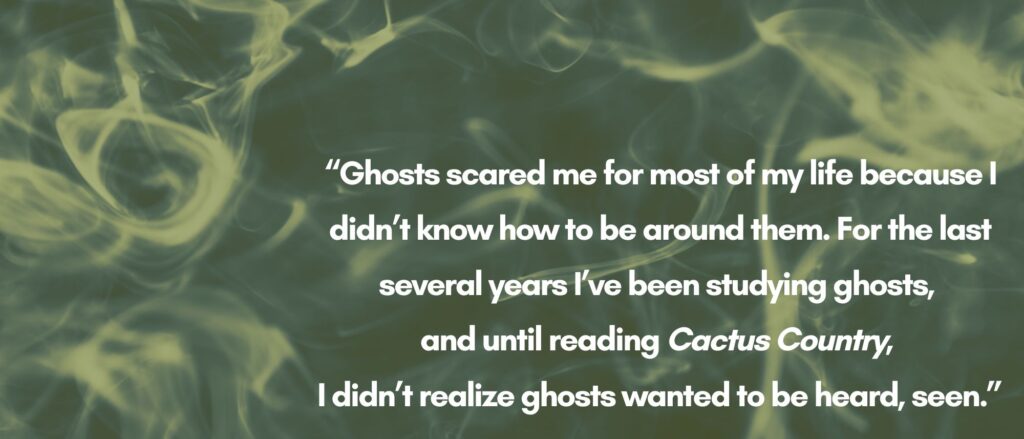
Knowing is an internal journey as well, which is why Cactus Country is such an important book. It invites us on such a journey, allowing us to witness the author’s joys and troubles. It can be too easy to feel isolated as we seek to understand our identities better. A continual coming out to ourselves.
We still need coming-out stories and ones of people struggling with their gender identity, because there are still ghosts struggling to be seen. On Trans Day of Visibility, Bossiere tweeted theirs was “the story I needed to hear all those years ago.” At forty-seven years old, I need her story, because as she writes in the final chapter, “For a lot of genderfluid people, the changes are much slower, with transitions occurring over months or years, like mine have.” Like mine have. Like ours have. All of us on our own timelines.
All of Us Strangers ends with Adam and Harry cuddled together in bed, the camera pulls out until they are stars in the night sky surrounded by an endless number of other stars. The takeaway: We’re all together even if we can’t see each other. More of a comfort on some days than others, but no less important. Cactus Country provides this kind of comfort. “There are so many stories, so many lives like ours, that have yet to be told. I give our story to you, and listen for yours,” Bossiere writes. A necessary call.
I’ve given you part of my story. It’s not dangerous for me to do so. That’s not the case for everyone. Some ghosts, like me and Bossiere, can shout while others must whisper. I can sense you anyways. There’s an urban legend that we must have everything figured out by a certain age. I can debunk that as my gender story is still unfolding. Recently, my therapist asked me if I consider myself trans as Bossiere does. I paused to think, consider. I told her I don’t know yet, but I’m excited to keep exploring.
—
Based in Chicago, Bruce Owen Grimm’s work appears in, among others, The Rumpus, Zócalo Public Square, and in the Los Angeles Times bestseller, It Came from the Closet: Queer Reflections on Horror. They coined the term “haunted memoir” in their essay of the same name published by Assay: A Journal of Nonfiction Studies. They are a co-editor of Fat and Queer: An Anthology of Queer and Trans Bodies and Lives (2021, Jessica Kingsley Publishers/Hachette). Fat and Queer won the 2022 AASECT Book Award for a general audience from the American Association of Sexuality Educators, Counselors, and Therapists as well as the Reads Rainbow’s Best Nonfiction 2021 Award.
